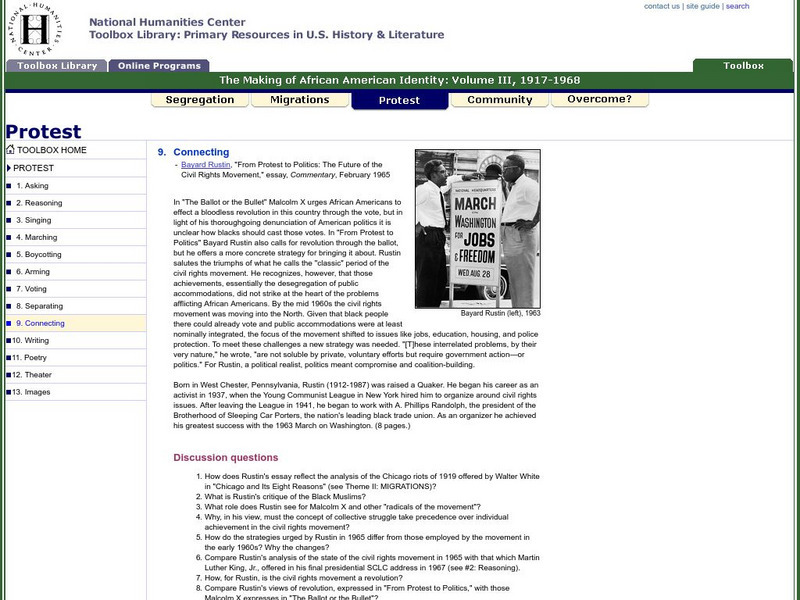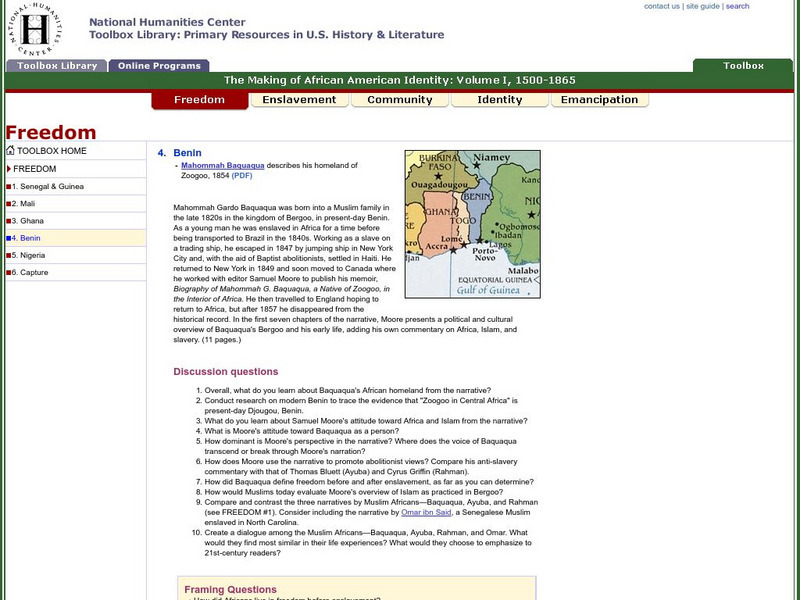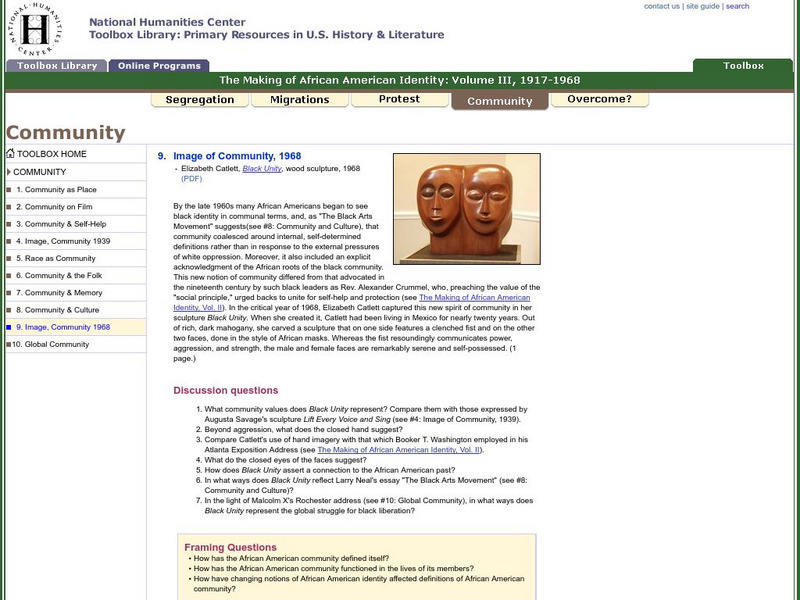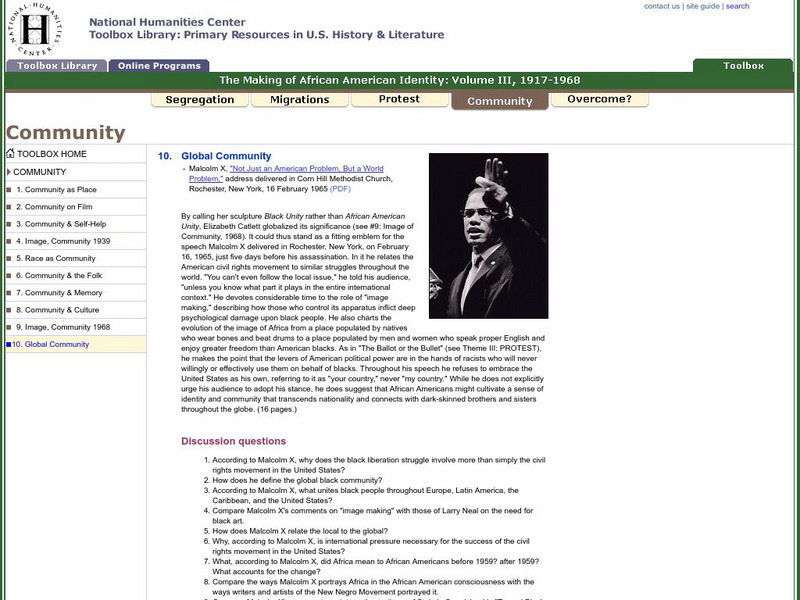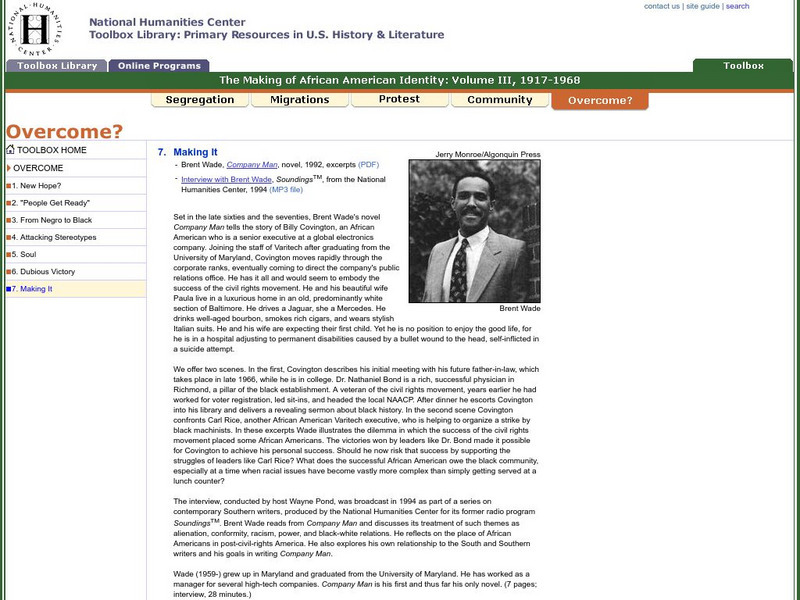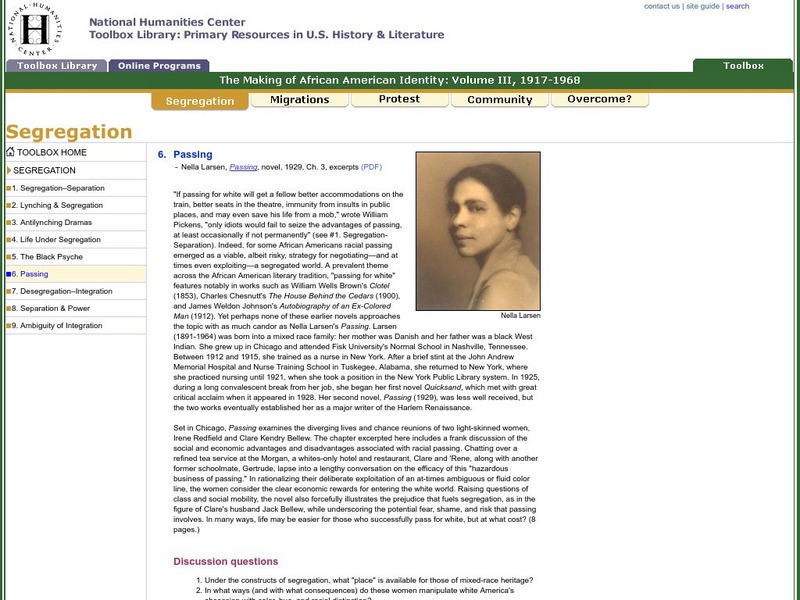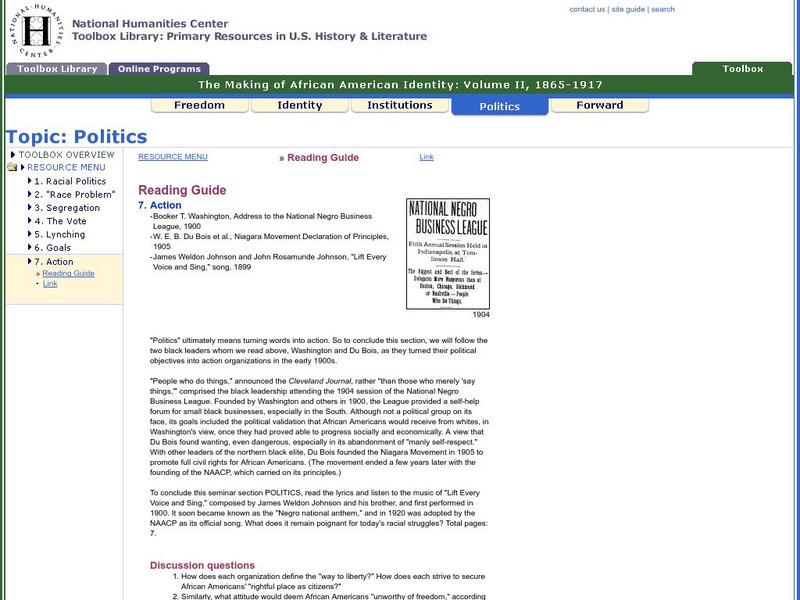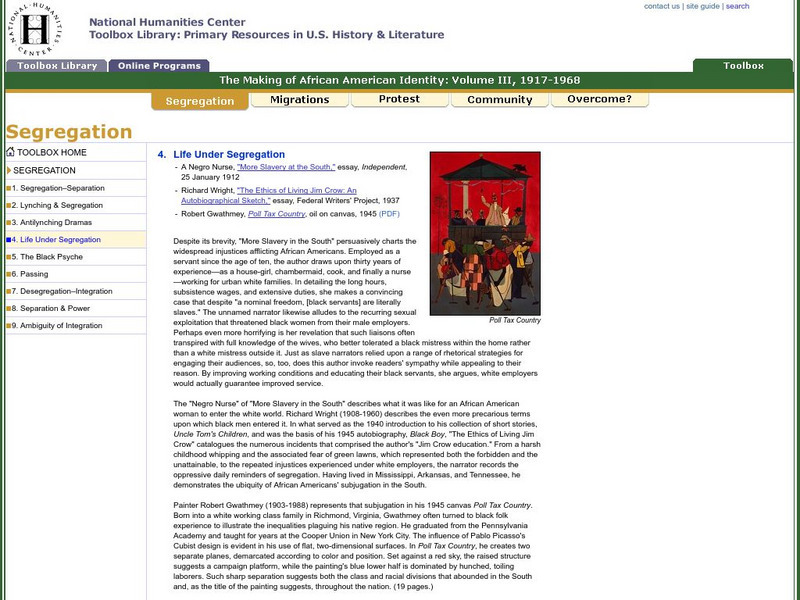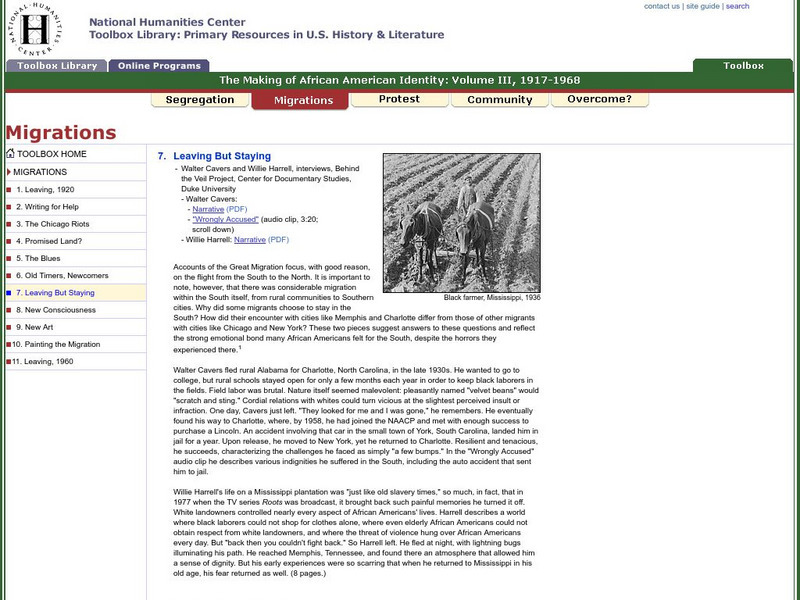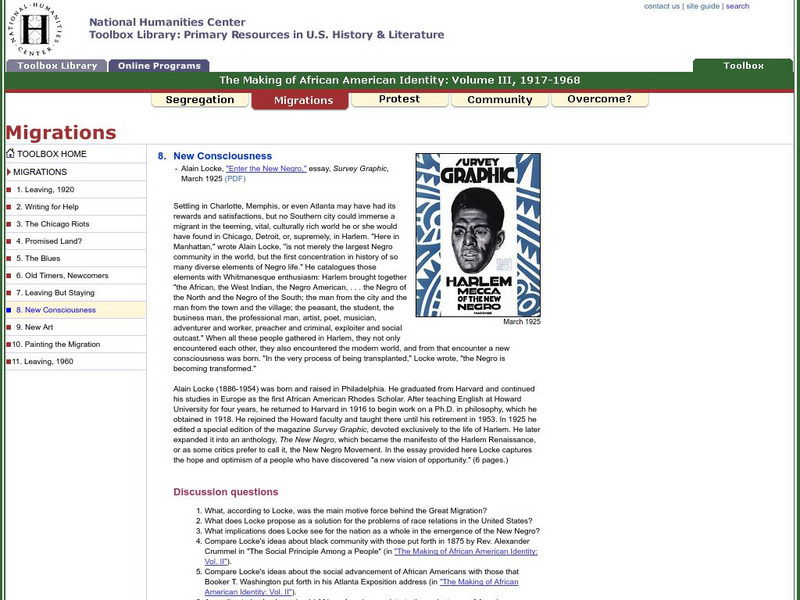National Humanities Center
National Humanities Center: Toolbox Library: Connecting: Making of African American Identity: V. 3
An article that makes a case for black engagement with the American political system. This resource provides a link to Bayard Rustin's "From Protest to Politics", where he encourages African Americans to begin a "revolution through the...
National Humanities Center
National Humanities Center: Toolbox Library: Community on Film, Making of African American Identity: V. 3
Excerpts from a 1941 film that depicts black and white communities in Kannapolis, NC, by H. Lee Waters (1902-1997). This two part film characterizes the differences in economy, community, and values of two separate cultures.
National Humanities Center
National Humanities Center: Toolbox Library: Bight of Biafra, Making of African American Identity: V. 1
An audio clip of a Yoruba drum and two accounts by slaves or their descendants that offer African perspectives on life and culture in the Niger River Delta.
National Humanities Center
National Humanities Center: Toolbox Library: Community & Self Help, Making of African American Identity:v. 3
An interview illustrating some of the ways community functioned in the lives of African Americans. It explores how external pressures of racism brought African Americans together to form fraternal organizations and entire towns.
National Humanities Center
National Humanities Center: Toolbox Library: Image of Community, 1939, Making of African American Identity
This resources illustrates how artist Augusta Savage (1892-1962) embodied the virtues of self-help, self-reliance, and close-knit cohesion of the black community in her sculpture Lift Every Voice and Sing (The Harp).
National Humanities Center
National Humanities Center: Toolbox Library: Image of Community, 1968, Making of African American Identity: V.
This article describes the history associated with the sculpture Black Unity, an image of African American community in 1968 by Elizabeth Catlett.
National Humanities Center
National Humanities Center: Toolbox Library: Global Community, Making of African American Identity: V. 3
On February 16, 1965, in Rochester, New York, Malcolm X delivered a speech that placed African American in a global black community. Just five days before his assassination, he relates the American civil rights movement to similar...
National Humanities Center
National Humanities Center: Toolbox Library: Attacking Stereotypes, Making of African American Identity: V. 3
Two images that express the growing militancy of the civil rights movement in the 1960s. This article explains how Joe Overstreet (1934-) and Betye Saar (1929-) went head to head with the formidable Aunt Jemima and with wit and irony...
National Humanities Center
National Humanities Center: Toolbox Library: Making It, Making of African American Identity: V. 3
Excerpts from a novel and an interview that illustrate where the success of the civil rights movement left some middle class African Americans. They explore the obstacles the civil rights movement had to overcome and the movement's...
National Humanities Center
National Humanities Center: Toolbox Library: The Making of African American Identity: Vol. Ii, 1865 1917: Migration
Congressional testimony and a letter that explore late nineteenth-century black migration from the South. Links to both resources are provided within this site.
National Humanities Center
National Humanities Center: Toolbox Library: Passing: Making of African American Identity: V. 3
An excerpt from a novel that explores the tensions of racial passing. Set in Chicago, Passing examines the diverging lives and chance reunions of two light-skinned women.
National Humanities Center
National Humanities Center: Toolbox Library: Community and Memory, Making of African American Identity: V. 3
A story that defines community as a connection between the past and the present. This resource links to Henry Dumas's short story, "Ark of Bones" and reviews its social commentary as it applies to African American community.
National Humanities Center
National Humanities Center: Toolbox Library: Freedom: Charles W. Chesnutt: African American Identity
Short story that explores the cultural and linguistic resources that sustained African Americans in the first years of freedom. This resource focuses on Charles Chesnutt and the influence he achieved by writing about race for a white...
National Humanities Center
National Humanities Center: Toolbox Library: Making of African American Identity: Segregation
A Supreme Court decision, a chapter from a novel, and an editorial that explore segregation in late-nineteenth-century America. This resource focuses primarily on Plessy v. Ferguson, and the complexities that followed from this ruling.
National Humanities Center
National Humanities Center: Toolbox Library: Making of African American Identity: Goals
The full text of Booker T. Washington's plea for white support of black enterprise and W. E. B. Dubois's response are provided within this resource, in addition to a summary of their positions.
National Humanities Center
National Humanities Center: Toolbox Library: Action, Making of African American Identity: V. 2
An address, a declaration of principle, and the Black National Anthem illustrating differing approaches to political action. The texts examine how Washington and Du Bois turned their political objectives into action organizations in the...
National Humanities Center
National Humanities Center: Toolbox Library: Making of African American Identity: Forward: The Naacp
In February 1909, to coincide with the centennial of Lincoln's birth, a group of northern white and black activists sent out letters calling for a national conference to address the problem of lynchings and mob violence. This site...
National Humanities Center
National Humanities Center: Toolbox Library: Making of African American Identity: Forward: Protest
An article that describes an NAACP meeting with Woodrow Wilson and excerpts from the film "Birth of a Nation." The text examines the gains and setbacks that mark the period of 1907 to 1917 for black Americans.
National Humanities Center
National Humanities Center: Toolbox Library: Segregation Separation: Making of African American Identity: V. 3
This resource summarizes and links to primary source articles examining the relationship between segregation and racial separation highlighting some of the effects of segregation on the black community post World War I.
National Humanities Center
National Humanities Center: Toolbox Library: Making of African American Identity: Segregation: Antilynching Dramas
Brief plays by Georgia Douglas Johnson that protest lynching are examined within this resource. Links to each play are provided in addition to a series of questions for discussion.
National Humanities Center
National Humanities Center: Toolbox Library: Life Under Segregation: Making of African American Identity: V. 3
Memoirs and a painting illustrating African American life under segregation. These resources help describe what it was like for an African American man or woman to enter the white world.
National Humanities Center
National Humanities Center: Toolbox Library: Making of African American Identity: The Promised Land?
A short story and a painting illustrating African American perceptions of Northern cities. Rudolph Fisher's short story "The City of Refuge" and William H. Johnson's painting Moon over Harlem offer insight into life within the black...
National Humanities Center
National Humanities Center: Toolbox Library: Making of African American Identity: Leaving, but Staying
Accounts of African American migrations from the rural South to Southern cities. This resource provides not just accounts of the Great Migration focusing on the flight from the South to the North, but also the migration within the South...
National Humanities Center
National Humanities Center: Toolbox Library: Making of African American Identity: New Consciousness
Alain Locke's essay, "Enter the New Negro," is provided within this site and describes a new African American sense of self, inspired by migration to the urban North.
